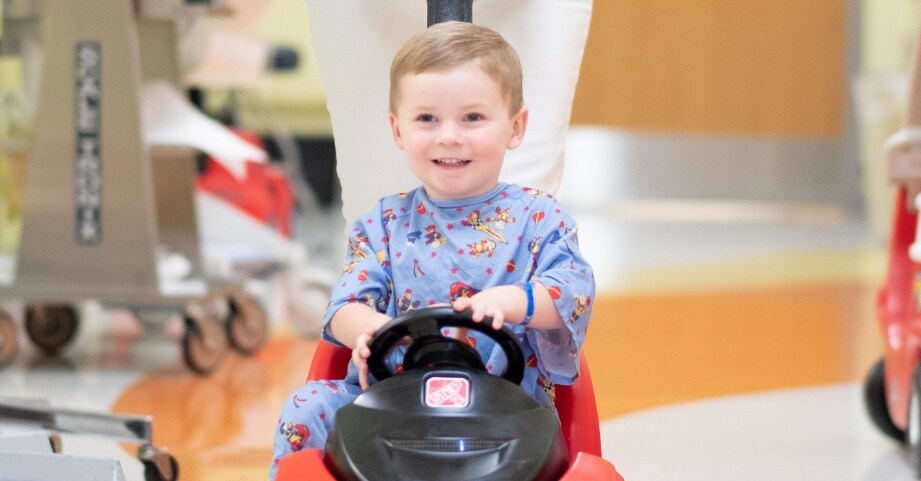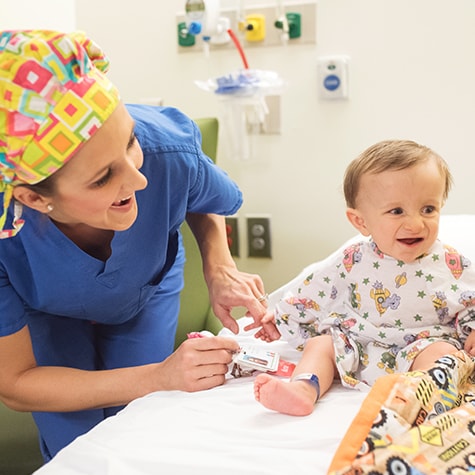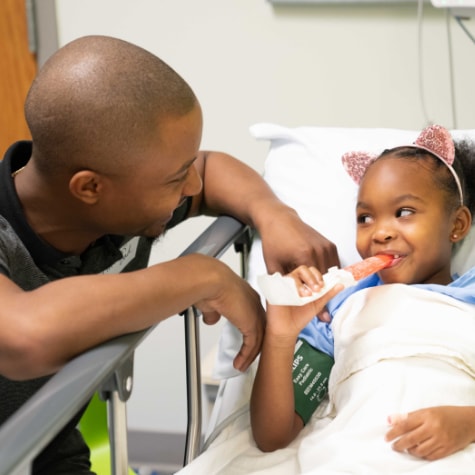What to Expect: Surgery Day and Going Home
Children’s Healthcare of Atlanta is here to support you and your child throughout their surgery journey. Learn more about what to expect after their procedure for a safe and healthy recovery.
Preparing for Surgery Day
Before surgery day, you will receive important information regarding your time of arrival, eating instructions and more. It’s crucial to follow pre-surgery instructions so your child or teen can be as safe as possible during their procedure. Learn more about how to prepare for surgery day before arriving for surgery.

Checking In and Waiting Room
Reminders:
- One legal guardian must stay onsite at all times in case your child’s surgeon needs to talk with you during surgery.
- There is no eating or drinking in the waiting room. Like your child, our other patients cannot eat or drink before surgery. We ask that you do not eat or drink out of respect for each child’s needs.
- If your procedure is at Arthur M. Blank Hospital or Scottish Rite Hospital, you can receive text message updates throughout your child’s surgery. Ask our staff about opting in for texts.
In the Patient Room
Once you are brought back to your patient room, your child’s nurse, doctor, anesthesia team and other surgery team members will meet with you and your child. A member of your care team will take your child’s height, weight and vital signs.
When it is almost time for surgery, the nurse will ask your child to remove all clothing and put on a gown. They may also give medicine to help your child relax.
Moving to the Operating Room for Surgery
When it is time for surgery, a nurse will take your child to the operating room (OR) from their day surgery room.
In the OR, a specially trained pediatric anesthesiologist will give your child a special medicine to fall asleep so they won’t feel anything during the procedure.
You may wait for your child to return from surgery in their patient room or the waiting room. If your procedure is at Arthur M. Blank Hospital or Scottish Rite Hospital, check out our amenities available during your visit.

Some facilities can’t guarantee a pediatric anesthesiologist for your child—we do.
While some hospitals may not be staffed to meet this need, at Children’s, every baby, child and teen receives care from a pediatric anesthesiologist who understands best practices for growing bodies.
learn moreWhat is the Post-Anesthesia Care Unit (PACU)?
After the procedure is over, your child may be moved to the post-anesthesia care unit (PACU), also known as the recovery room, depending on their procedure. Your child will be closely monitored while they wake up from anesthesia. Their length of stay in the PACU varies.
Waking Up
The time it takes patients to wake up from anesthesia varies. Your child may wake up confused or agitated. This is very common for children and teens. Once your child is safe and settled in recovery, they will be brought back to their patient room where your child’s surgeon will speak to you about the procedure.
Symptoms After Surgery
Your child may feel nausea or vomit after waking up from anesthesia. This is normal. Learn more about post anesthesia symptoms for your child’s age range:
- After Anesthesia - Caring for Your Baby (Newborn to 1 Year) (Español)
- After Anesthesia - Caring for Your Child (Toddlers and School Age Children) (Español)
- After Anesthesia - Caring for Your Teen (Español)
Will my child be in pain after surgery?
Pain after surgery is common and expected. Your child’s care team will create a pain plan to help manage their discomfort. Talk to your child’s care team if you have concerns about their pain.
Fall safety
Your child will be a fall risk following their surgery. Do not let them get up without assistance. A team member will talk with you about caring for your child at home. We appreciate your partnership in preventing falls.

Enhanced Recovery After Surgery
Learn how we customize your child’s surgery experience to help them have a better recovery and get back to activities sooner.
learn moreGoing Home
The amount of time it takes to be ready to go home is different for each child.
Before going home, we will make sure your child:
- Is breathing well.
- Has a surgery site that looks as expected.
- Has a pain level that can be controlled with medicine at home.
At the discretion of your child’s care team, your child can go home when they are awake and comfortable, and your questions have been answered. Before you leave, team members will talk with you about caring for your child at home. They will also give written instructions and prescriptions if needed. Your child may still be sleepy when they leave.
If you have any questions or concerns once home, please call the surgeon’s office; if after hours, please call 404-785-KIDS.
Staying Overnight in Our Facilities
In some cases, your care team may determine your child needs to be monitored overnight to meet the necessary guidelines. Your child’s nurse will talk with you about this as your child wakes up. Learn more about what to expect during an overnight stay.
The time it takes patients to wake up from anesthesia varies. Your child may wake up confused or agitated. This is very common for children and teens. Once your child is safe and settled in recovery, they will be brought back to their patient room where your child’s surgeon will speak to you about the procedure.
Additional Resources for Your Surgery Journey
Contact Us 404-785-KIDS (5437)


